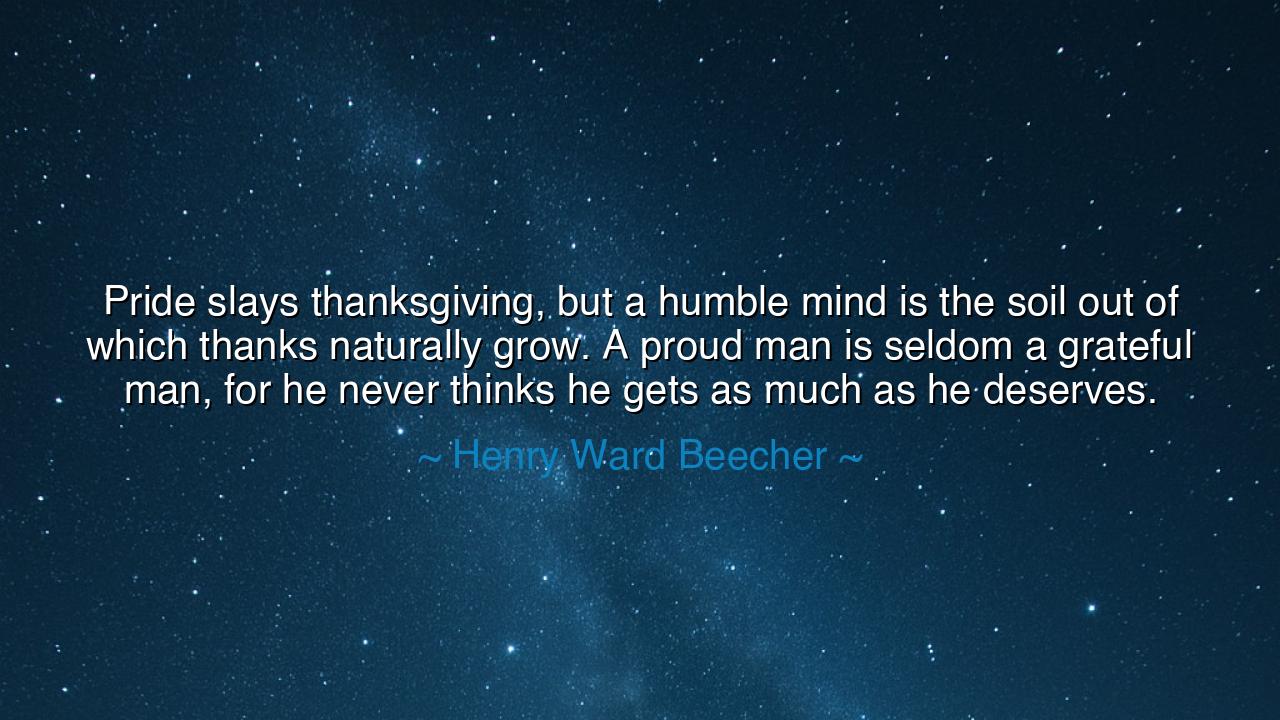
Pride slays thanksgiving, but a humble mind is the soil out of
Pride slays thanksgiving, but a humble mind is the soil out of which thanks naturally grow. A proud man is seldom a grateful man, for he never thinks he gets as much as he deserves.






"Pride slays thanksgiving, but a humble mind is the soil out of which thanks naturally grow. A proud man is seldom a grateful man, for he never thinks he gets as much as he deserves." In this piercing observation, Henry Ward Beecher draws a sharp contrast between the proud and the humble, between those who see the world as their owed possession and those who receive life as a gift. His words are a warning that pride is a thief, robbing the heart of gratitude, while humility, like fertile soil, yields an abundant harvest of thanksgiving. Gratitude, therefore, is not merely a polite response but the fruit of an inner posture—one either poisoned by entitlement or nourished by humility.
The origin of this teaching lies in both Scripture and human history. Throughout the ages, wise men have proclaimed that gratitude is not born from abundance, but from recognition. The proud believe they deserve all they have and more; thus, nothing satisfies them. The humble see every breath, every morsel, every kindness as unearned, and so they overflow with thanksgiving. Beecher, as a preacher in nineteenth-century America, was reminding his listeners that the greatness of a nation or of a person cannot be measured by riches alone, but by the spirit of gratitude that sustains them in both feast and famine.
History confirms his words. Consider the tale of King Nebuchadnezzar in the Book of Daniel. In his pride, he declared that his own hand had built Babylon in splendor, forgetting the God who gave him power. His arrogance stripped him of reason, and he lived like a beast until he learned humility. Only then did gratitude return to his lips, and only then was his kingdom restored. Pride had slain his thanksgiving, but humility revived it. His story remains a timeless parable: pride blinds the eyes, while humility opens them to the blessings already in our midst.
We see the same truth in more recent history. During the Great Depression, when countless families had little more than bread crusts and watered soup, many still bowed their heads in thanksgiving. They did not believe the world owed them comfort, and so even the smallest mercy was met with gratitude. Contrast this with eras of excess, when men surrounded by plenty became restless and bitter because they believed they deserved more. Beecher’s warning rings true: the proud man, in his endless hunger, is never satisfied, and thus never truly grateful.
There is also a heroic power in the image of humility as soil. Soil does not boast; it receives seed, water, and sunlight, and from this lowliness springs forth life. So too does a humble mind—when it receives blessings without entitlement, thanks springs up as naturally as flowers in a meadow. Pride, on the other hand, is barren ground, hardened and unyielding, where no gratitude can take root. To cultivate humility, then, is not weakness, but the strongest act, for it ensures the heart will bear the fruit of thanksgiving in every season.
The lesson for future generations is this: guard yourselves against pride, for it is the slayer of gratitude and the enemy of joy. Teach your children not that they deserve all things, but that all things are gifts. When they rise in the morning, let them know even the breath in their lungs is mercy. When they eat at the table, let them remember that countless hands have labored for their bread. When they prosper, let them acknowledge the unseen forces of grace, family, and fortune that made it possible. In this way, thanksgiving will never die from their hearts.
Practical action flows from Beecher’s words. Begin each day by naming aloud the blessings you did not earn. Practice humility in speech and deed—listen before speaking, serve before being served, give thanks before asking for more. When you are tempted to complain, recall the truth: pride believes you deserve more, while humility teaches you to see that you already have much. Cultivate the soil of humility, and gratitude will grow like a mighty tree, shading generations after you.
Thus, Beecher’s wisdom endures like a flame across the ages: pride slays thanksgiving, but humility revives it. The proud man is a beggar who believes himself a king, and thus remains empty. The humble man is a servant who sees himself blessed, and thus overflows with joy. Let this teaching be etched in the hearts of all who hear it: that the secret of thanksgiving is not found in what you possess, but in how you perceive—and only the humble heart can truly give thanks.






AAdministratorAdministrator
Welcome, honored guests. Please leave a comment, we will respond soon